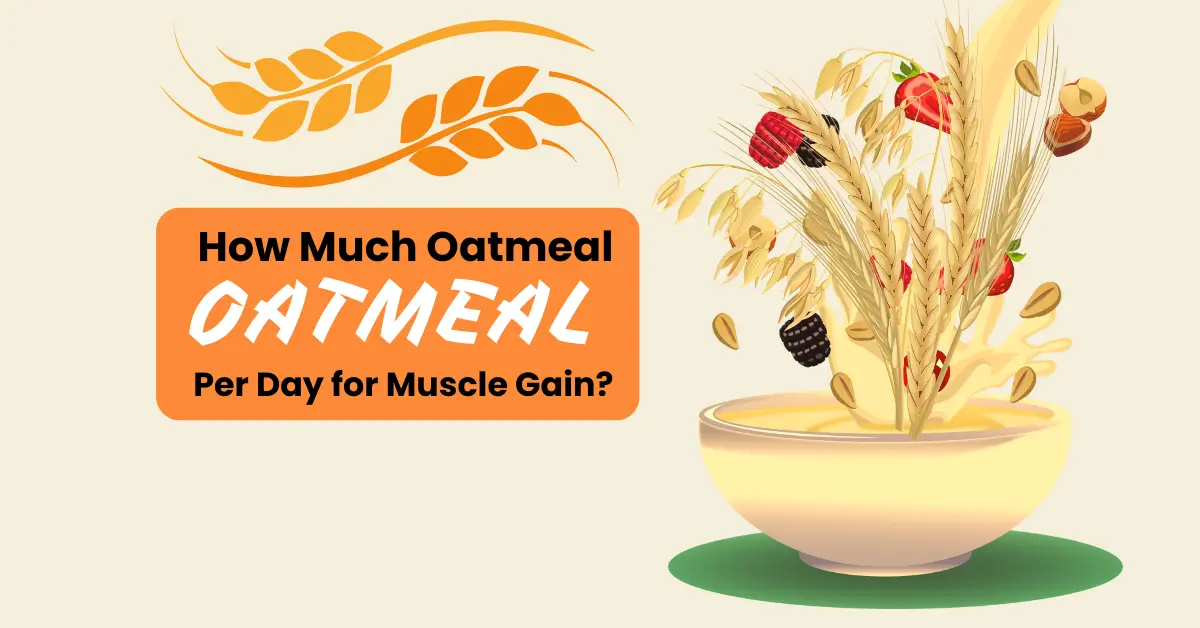Do you know the importance of oatmeal for muscle gain and weight loss, learn how to fuel your workouts and help you achieve your fitness goals. Get expert-backed tips, recipes, and the benefits of eating oats daily.
Thank you for reading this post, don't forget to subscribe!Oatmeal is a whole-grain breakfast food that is delicious and packed with essential nutrients. From classic oatmeal bowls to baked oatmeal recipes, overnight oats, and oatmeal smoothies, this food is incredibly adaptable.
How to Gain Muscle and Lose Weight with Oatmeal
Oatmeal is an excellent source of complex carbohydrates, fiber, and protein, which makes it an ideal food for those looking to build muscle and lose weight.
The high fiber content in oatmeal helps keep you full for longer periods, reducing the urge to snack between meals.
The protein in oatmeal is of high quality and contains all the essential amino acids necessary for muscle growth and development.
In addition to being low in calories, fiber, and protein, oatmeal is also rich in vitamins and minerals. It contains iron, magnesium, zinc, and vitamin B6, all of which are essential for optimal health.
The beta-glucan fiber found in oatmeal has been shown to help reduce cholesterol levels, lower blood sugar levels, and improve gut health.
Overall, oatmeal is a great food choice for anyone looking to improve their health and well-being. It is a versatile food that can be enjoyed in various ways, and its numerous health benefits make it a valuable addition to any diet.
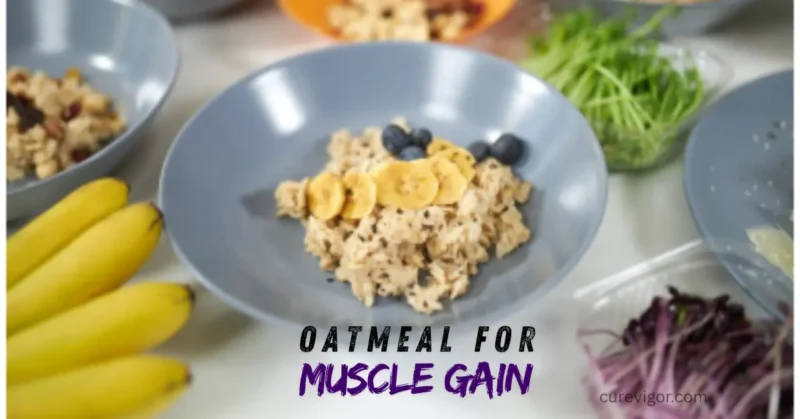
Oatmeal is more than just a cozy breakfast. It’s a powerful whole grain packed with nutrients that support weight loss, muscle growth, and energy.
Whether you’re building lean muscle or shedding fat, oatmeal can help fuel your weight loss or weight gain goals. Let’s break down how this simple food supports your body from the inside out.
Understanding Oatmeal and Its Fitness Benefits
What Makes Oatmeal So Good for You?
Oatmeal is made from whole oats and is naturally rich in complex carbs, plant-based protein, and soluble fiber. These nutrients support long-lasting energy, stable blood sugar levels, and a feeling of fullness.
Types of Oatmeal to Know
- Steel-cut oats: Least processed, chewy, and great for slow digestion.
- Rolled oats: Slightly processed, softer, and quicker to cook.
- Instant oats: Most processed and best for convenience, but lower in fiber.
Choose steel-cut or rolled oats for the most nutritional benefits and muscle-supporting power.
Oatmeal for Muscle Gain – The Ultimate Fuel for Strength
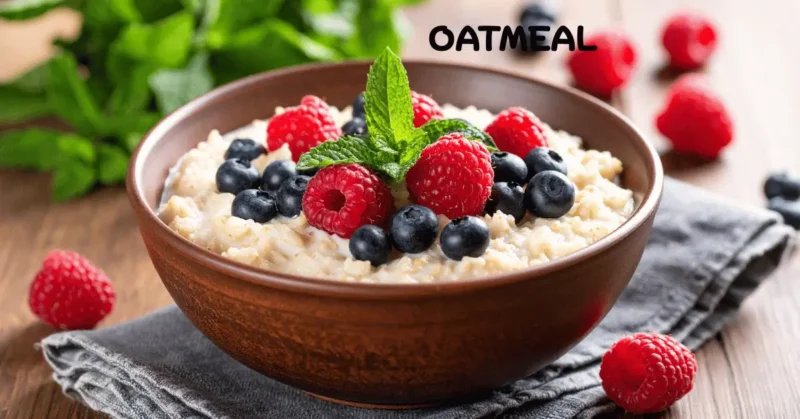
Power-Packed Nutrition for Muscle Growth Rich in High-Quality Protein – Each cup of cooked oats provides 6g of protein with all 9 essential amino acids for optimal muscle repair and growth.
Slow-Release Carbs – Sustained energy for intense workouts (weightlifting, endurance training) without energy crashes.
Why Athletes & Bodybuilders Choose Oats Perfect Pre-Workout Fuel – Provides steady energy, enhancing performance and endurance.
Ideal Post-Workout Recovery – Replenishes glycogen stores and supports muscle repair (pair with whey protein or milk for best results).
Maximizing Muscle Gains with Oats Boosts Protein Intake – Combine with Greek yogurt, nuts, or protein powder for a muscle-building meal.
Supports Lean Muscle Mass – Helps reduce fat storage while promoting strength gains.
Key Takeaway: Oatmeal is a must-have for muscle growth, delivering clean energy, muscle-building protein, and superior recovery benefits.
Pro Tip: For best results, eat oats 1-2 hours before your workout or post-training with a protein shake.
Oatmeal for Weight Loss
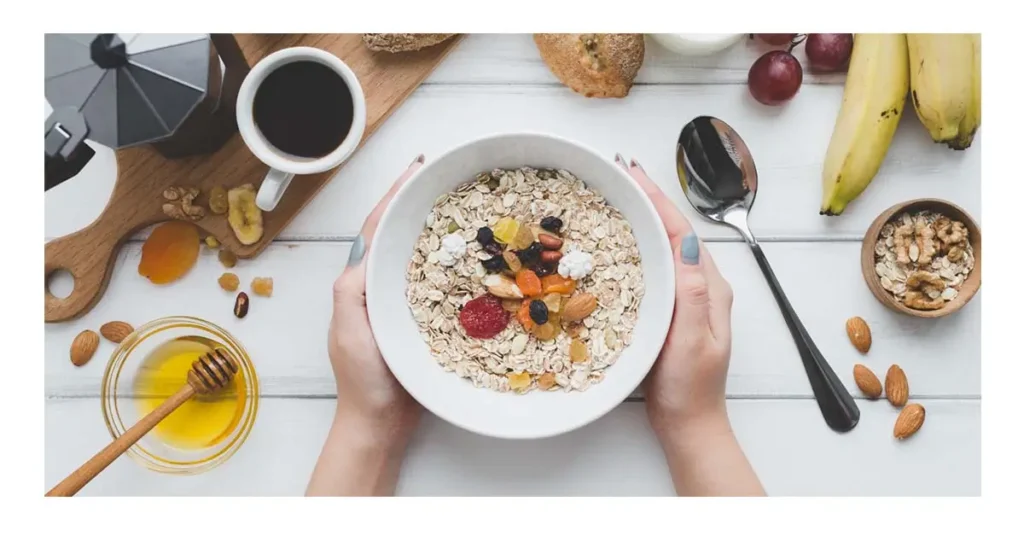
For our complete guide on using oatmeal for fat loss, see our post on The Oatmeal Paradox.
- High in Fiber & Satiating:
- Contains soluble fiber (like beta-glucan) that forms a gel in the gut, slowing digestion and keeping you full longer.
- Reduces cravings and prevents overeating, helping to control calorie intake.
- Stabilizes Blood Sugar & Burns Fat:
- A low-glycemic index prevents blood sugar spikes, helping to regulate insulin and promote fat burning.
- Supports long-term fat loss, especially belly fat, compared to sugary or processed foods.
- Sustained Energy & Easy to Customize:
- Provides slow-digesting carbs and protein for steady energy, helping to avoid crashes and hunger pangs.
- Versatile and affordable—add fruits, nuts, or spices for a tasty, weight-loss-friendly meal.
Key Takeaways:
Prolongs feelings of fullness → Reduced desires
Supports fat loss → Better than crash diets
Energy-boosting → Helps stick to calorie goals
Nutritional Value of Oatmeal – A Superfood for Optimal Health
Macronutrient Powerhouse
- Complex Carbohydrates: Slowly digested for steady energy, ideal for weight management and diabetes control
- All nine of the essential amino acids needed for muscle growth and repair are present in high-quality protein (6g protein per heated cup).
- Rich in Fiber: Supports digestive health, prevents constipation, and may lower colon cancer risk
Essential Vitamins & Minerals
- Iron – Boosts energy levels and oxygen transport
- Magnesium – Supports muscle & nerve function
- Phosphorus – Strengthens bones & teeth.
- Zinc – Enhances immunity & metabolism
Why Oatmeal is a Must-Have Superfood
- Balanced Nutrition – Perfect meal for weight loss, muscle gain, and heart health
- Versatile & Easy to Prepare – Enjoy as overnight oats, porridge, or in smoothies
- Naturally Gluten-Free (Choose certified oats if gluten-sensitive)
Key Takeaway:
An excellent supplement to any nutritious diet, oatmeal is a nutrient-dense superfood rich in essential minerals, gut-friendly fiber, muscle-building protein, and energy-boosting carbohydrates.
Nutrition Breakdown of Oatmeal
One cup of cooked oats offers:
- Calories: ~150
- Protein: 5–6 grams
- Carbs: ~27 grams (complex)
- Fiber: 4 grams (mostly soluble)
- Iron, magnesium, and B vitamins: All support muscle and metabolic health
The fiber also helps manage cholesterol and supports heart and gut health.
Best Time to Eat Oatmeal for Muscle Gain
The timing of when you eat oatmeal can be just as important as the quantity you consume. Timing your oats around your workouts helps your body use them more efficiently for energy, recovery, and muscle growth.
Whether you’re lifting heavy or following a high-intensity training program, the right timing can maximize your results.
1. Pre-Workout: Power Up Your Performance
Eating oatmeal 1–2 hours before training is one of the best ways to fuel your body for an intense workout. Oats provide slow-digesting complex carbohydrates, which release energy steadily and prevent blood sugar spikes or crashes.
Pairing oats with a lean protein source—like whey protein, egg whites, or Greek yogurt—ensures your muscles have both energy and amino acids available during exercise.
Example pre-workout meal:
- ½ cup oats cooked in milk
- 1 scoop whey protein
- ½ banana or a handful of berries
This meal gives a perfect mix of carbs for energy, protein for muscle protection, and fiber for satiety. You’ll train longer and recover faster.
2. Post-Workout: Refuel and Rebuild
After a tough workout, your body needs to replenish glycogen stores and repair muscle tissue. Oatmeal makes a great post-workout carb source, especially when combined with a fast-digesting protein.
Aim to eat oats within 30–60 minutes after training to make the most of your body’s recovery window.
Example post-workout bowl:
- ¾ cup oats
- 1 scoop whey or casein protein
- 1 cup low-fat milk
- A drizzle of honey or maple syrup for quick carbs
This combo provides an ideal 3:1 or 4:1 carb-to-protein ratio, which is shown to boost glycogen synthesis and muscle recovery.
3. Morning Oats: Building a Consistent Foundation
Even on non-training days, starting your day with oatmeal helps stabilize energy and maintain lean muscle mass. A balanced oatmeal breakfast prevents mid-morning crashes and supports muscle recovery from previous workouts.
Add-ins for extra benefit:
- Greek yogurt or protein powder for more protein
- Nuts or nut butter for healthy fats
- Fruit for antioxidants and vitamins
Morning oats set the tone for the day, keeping your metabolism active and your hunger levels balanced.
4. Evening or Bedtime Oats: The Underrated Option
Yes, you can eat oatmeal at night! If you’re in a muscle-building phase or struggle to meet your calorie goals, having oats before bed provides slow-release energy that supports overnight muscle repair.
Tip: Mix oats with casein protein or Greek yogurt. Casein digests slowly, feeding your muscles with amino acids while you sleep.
Summary: When to Eat Oats for Best Gains
| Timing | Benefits | Best Combination |
|---|---|---|
| Pre-Workout (1–2 hrs before) | Steady energy, improved endurance | Oats + whey protein + banana |
| Post-Workout (within 60 mins) | Glycogen recovery, muscle repair | Oats + milk + protein powder |
| Morning Meal | Sustained energy, metabolism boost | Oats + Greek yogurt + fruit |
| Evening Snack | Overnight recovery, calorie support | Oats + casein + nuts |
The best time to eat oatmeal for muscle gain depends on your schedule and goals, but the most effective times are before and after workouts. Pre-workout oats power your training, while post-workout oats rebuild your muscles.
Add consistency, quality protein, and healthy fats, and your oatmeal will work just as hard as you do in the gym.
Benefits of Eating Oatmeal
- Rich in Soluble Fiber: Supports digestion, prevents constipation, and promotes gut health. Also helps lower cholesterol, thereby reducing the risk of heart disease.
- Sustained Energy Release: Unlike refined carbohydrates, oatmeal provides slow-digesting energy, which improves focus, productivity, and physical performance.
- Versatile & Heart-Healthy: A simple yet powerful food that aids weight management, muscle recovery, and overall well-being.
Oatmeal vs. Other Breakfast Options
Compared to sugary cereals, oatmeal has more fiber and zero added sugar. Unlike toast or white rice, it digests more slowly and provides a steady energy source.
Eggs are rich in protein, but oatmeal provides the carbs and fiber your body also needs after exercise.
Oatmeal is a highly nutritious breakfast with several unique advantages compared to other popular breakfast choices, such as cereal or eggs.
For example, while cereal is often loaded with added sugars, oatmeal is an excellent source of carbohydrates, protein, and fiber, which helps keep you feeling full and energized throughout the day.
Furthermore, while eggs are an excellent source of protein, oatmeal provides additional benefits by providing essential micronutrients and a significant amount of fiber.
Oatmeal contains a type of fiber known as beta-glucan, which has been linked to several health benefits, including reduced cholesterol levels and improved heart health.
By incorporating it into your morning routine, you can enjoy a delicious and satisfying meal that will keep you fueled and focused throughout the day.
Pairing oats with protein-rich foods makes the ultimate balanced breakfast.
How to Incorporate Oatmeal into Your Diet
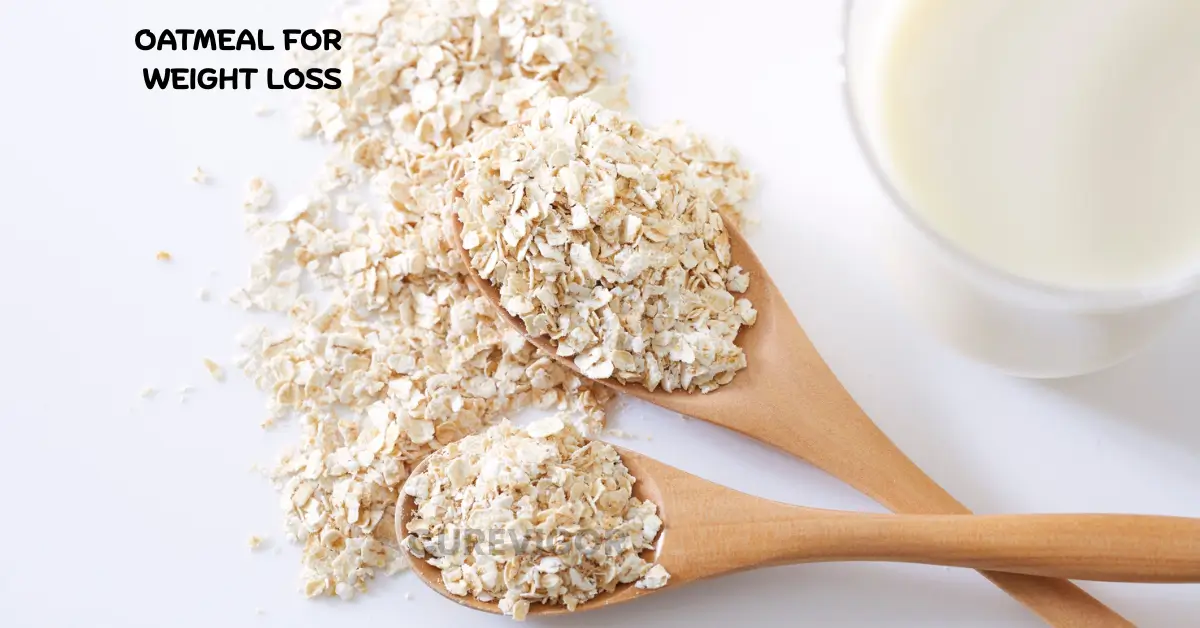
- Nutritious and versatile, oatmeal is a healthy food that provides energy and can be enjoyed in various ways.
- Classic Breakfast Option: Enjoy oatmeal bowls with fruits, nuts, or seeds for a tasty, customizable meal.
- Pre- or Post-Workout Meal: Rich in carbs, fiber, and protein, oatmeal fuels workouts and aids recovery (add protein powder for extra benefits).
- Different Types Available: Rolled and steel-cut oats are healthier than instant oats—less processed and keep you full longer.
- Daily Health Benefits: Promotes general well-being, keeps you full, and helps you stay well.
Delicious Oatmeal Recipes for Fitness Goals
1. Protein Oat Bowl (Post-Workout Power Meal)
This recipe is ideal for post-workout recovery, replenishing glycogen, repairing muscle tissue, and helping to curb hunger.
Ingredients:
- 1/2 cup rolled oats
- 1 cup low-fat milk or almond milk
- 1 scoop vanilla or chocolate protein powder
- 1 small banana, sliced
- 1/2 teaspoon cinnamon
- 1 tablespoon natural peanut butter
- Optional: chia seeds, cacao nibs, or a drizzle of honey
Instructions:
- In a small saucepan, cook the rolled oats with milk over medium heat. Stir occasionally until the oats are soft and creamy (about 5–7 minutes).
- Once cooked, remove the dish from the heat and mix in the protein powder. Stir until smooth and well-combined.
- Add banana slices, cinnamon, and a spoonful of peanut butter on top.
- Serve warm. Garnish with chia seeds or a pinch of cacao nibs if desired.
Why it’s great for muscle gain:
This bowl combines high-quality protein, complex carbs, and healthy fats—perfect for post-workout recovery. The banana helps replenish glycogen stores, while protein powder and peanut butter provide essential amino acids for muscle repair.
2. Overnight Oats with Berries (Easy Morning Fuel)
Overnight oats are a no-cook solution for busy mornings. They’re creamy, portable, and packed with nutrients that support both fat loss and lean muscle development.
Ingredients:
- 1/2 cup rolled oats
- 1/2 cup unsweetened almond milk
- 1/2 cup Greek yogurt (plain, high-protein)
- 1 tablespoon chia seeds
- 1/2 cup frozen or fresh mixed berries (blueberries, raspberries, strawberries)
- 1/2 teaspoon vanilla extract (optional)
- Optional: honey or maple syrup for sweetness
- Toppings: sliced almonds, hemp seeds, or nut butter
Instructions:
- In a mason jar or container, combine oats, almond milk, Greek yogurt, chia seeds, and vanilla extract. Mix well.
- Fold in the berries.
- Cover and refrigerate overnight (or for at least 4 hours).
- In the morning, stir and top with almonds, seeds, or a drizzle of nut butter.
Why it’s great for fitness goals:
This meal is packed with casein protein (from Greek yogurt), slow-digesting carbs, and antioxidants. It supports muscle recovery overnight and fuels your metabolism in the morning.
Chia seeds provide omega-3 fatty acids and fiber, promoting satiety and supporting fat burning.
3. Savory Spinach & Egg Oatmeal (High-Protein Breakfast or Lunch)
Savory oats are a smart way to add vegetables and protein to your first meal. This recipe balances macros for fat loss and strength.
Ingredients:
- 1/2 cup rolled oats
- 1 cup low-sodium vegetable or chicken broth (instead of water)
- 1 teaspoon olive oil
- 1 garlic clove, minced
- 1/2 cup mushrooms, sliced
- 1 cup fresh spinach, chopped
- 1/4 teaspoon black pepper
- 1/4 teaspoon sea salt
- 2 tablespoons grated Parmesan or nutritional yeast
- 1 poached or soft-boiled egg
Instructions:
- In a small pot, bring broth to a boil. Stir in oats and reduce the heat to a simmer. Cook for about 5–6 minutes, stirring occasionally.
- Meanwhile, heat olive oil in a skillet. Add garlic and mushrooms, sauté for 5 minutes. Add spinach and cook until wilted.
- When oats are thick and creamy, stir in the sautéed veggies—season with salt and pepper.
- Pour into a bowl, top with grated cheese and a poached egg.
Why it’s perfect for fitness:
This savory bowl is packed with muscle-supporting nutrients like iron, B vitamins, and complete protein from the egg. The vegetables add fiber and antioxidants. It’s also low in sugar, making it ideal for fat loss phases or low-glycemic index (GI) diets.
Tips for Buying and Storing Oatmeal
You can get the most nutritional benefits when purchasing oatmeal by opting for whole or steel-cut oats. These varieties retain more fiber and nutrients than instant oats, which are often more processed.
Whole oats are the least processed of the three, with only the outer husk removed, while steel-cut oats are made by cutting entire oats into small pieces. Both options provide a hearty texture and nutty flavor that many people enjoy.
In terms of storage, keeping your oatmeal in a cool, dry place is essential. Please follow the instructions to prevent the item from spoiling and maintain its freshness.
Moisture and heat can cause your oatmeal to spoil more quickly, so storing it in an airtight container away from direct sunlight is recommended.
By taking these simple steps, you can help ensure that your oatmeal stays fresh and delicious for as long as possible.
Overnight Oats for Muscle Gain and Fat Loss
Overnight oats are a quick and powerful way to boost muscle gain while supporting fat loss. Made by soaking rolled oats in milk or yogurt overnight, this no-cook option saves time and packs a nutritional punch.
They’re perfect for busy mornings or post-workout recovery. You can add protein powder, Greek yogurt, chia seeds, or nut butters to increase the protein content, which is crucial for building lean muscle.
The fiber in oats helps with satiety and curbs late-night cravings, which aids in reducing fat.
Their slow-digesting carbs provide sustained energy without blood sugar spikes, making overnight oats an ideal choice for promoting fat metabolism and maintaining stable performance.
For best results, pair with low-fat milk or almond milk and add fruits like berries or bananas for natural sweetness and antioxidants.
This high-protein meal keeps your body in a muscle-building and fat-burning zone throughout the day.
Best Oats for Muscle Gain and Fat Loss
In terms of fitness, oats are not all made equal. Select steel-cut oats or traditional rolled oats for the best results. Because they digest more slowly, have more fiber, and are less processed, these kinds of foods help you maintain steady energy levels and feel fuller for longer.
The most nutrient-dense oats are steel-cut ones, which also have a chewy texture and take longer to digest. By lowering appetite and avoiding energy dips, it is beneficial for fat loss.
Rolled oats are a great option for weight management and muscle recovery, as they are slightly more processed but still rich in fiber and protein. Avoid flavored instant oats, as they often contain added sugars and sodium that hinder weight loss and muscle growth.
To maximize your gains, cook your oats in milk or water, then add clean sources of protein and healthy fats for a well-rounded meal that supports your fitness goals.
Is Oatmeal Good for Weight Loss and Muscle Gain?
Yes—oatmeal is one of the few foods that supports both weight loss and muscle gain effectively. It’s a rich source of complex carbs, which provide energy during workouts, and dietary fiber, which promotes satiety and digestion.
Its natural protein content may seem modest, but it becomes powerful when paired with other protein-rich foods. Oatmeal helps preserve muscle mass during a calorie deficit, which is vital for maintaining a healthy weight loss.
The high fiber also aids in appetite control, making it easier to maintain a calorie-controlled diet.
When combined with resistance training and adequate protein, oatmeal becomes an ideal food for body recomposition, helping to lose fat while gaining lean muscle.
Oatmeal with Milk for Weight Loss
Oatmeal with milk is a balanced meal that supports weight loss when consumed in moderation and in the correct portion size. Milk provides complete protein, calcium, and vitamin D, which boost bone strength and metabolism.
Oats provide fiber and complex carbohydrates, offering a feeling of long-lasting fullness and helping to control blood sugar levels.
Using low-fat or plant-based milks, such as unsweetened almond or oat milk, can help reduce total calorie intake while preserving essential nutrients. For added satiety, try adding chia seeds, cinnamon, or a spoonful of Greek yogurt.
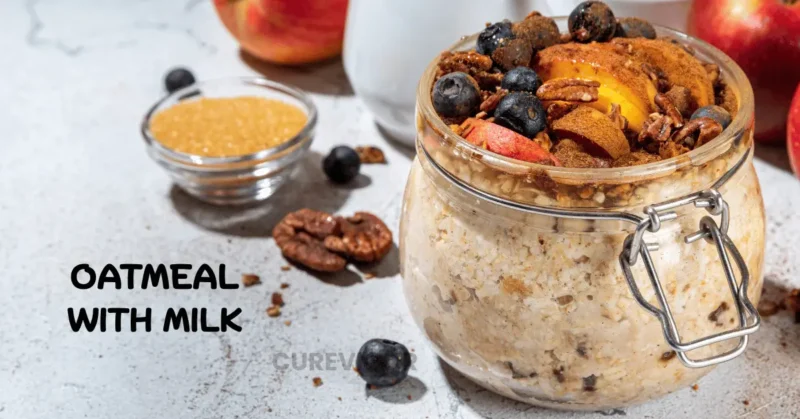
This combination also supports muscle preservation, especially when you’re reducing calorie intake. The key is to keep added sugars low and stick to whole-food toppings, such as berries, bananas, or nuts.
Does Oatmeal Help with Muscle Growth?
Indeed, oatmeal is beneficial for promoting muscle building, especially when paired with resistance training nd a healthy protein diet. While oats are mostly known for carbs, they also contain about 5–6 grams of protein per serving, plus all nine essential amino acids.
That’s impressive for a plant-based food. The complex carbs in oats fuel tough workouts, while the soluble fiber helps regulate nutrient absorption and insulin levels—factors that influence muscle recovery.
Oats also contain magnesium and iron, two minerals essential for muscle function and oxygen delivery. For optimal results, combine oats with a source of complete protein, such as eggs, whey protein, or Greek yogurt.
If you want a clean-burning energy source that helps you train harder, recover faster, and stay lean, oatmeal should be part of your muscle-building meal plan.
Can Someone with a gluten sensitivity eat oatmeal?
Yes, but with an important caveat. Oats themselves are naturally gluten-free. However, most conventional oats are processed in facilities that also handle wheat, barley, or rye grains, which contain gluten.
Due to the risk of cross-contamination, individuals with non-celiac gluten sensitivity or celiac disease should avoid consuming ordinary oats.
To enjoy oats safely, choose certified gluten-free oats. These are grown, harvested, and processed using dedicated gluten-free equipment. Brands such as Bob’s Red Mill, Quaker Gluten-Free, and GF Harvest offer trusted options.
These oats undergo strict testing to ensure they meet gluten-free standards (usually under 20 parts per million).
Some individuals with gluten intolerance may still react to a protein in oats called avenin, although this is uncommon. Before including oats in your diet, speak with your doctor if you have a history of digestive problems or have just received a diagnosis.
Gluten-free oats are just as beneficial for muscle gain and weight loss. They are ideal for gluten-free exercise enthusiasts, as they still provide the same complex carbohydrates and high fiber content, along with clean energy, without the risk of gluten.
Is There a Downside to Eating Oatmeal Daily?
For most people, eating oatmeal daily is safe and even recommended. However, a few potential downsides can arise depending on individual digestion, portion sizes, and preparation methods.
Bloating, gas, or stomach discomfort are possible side effects for some people, particularly if they start eating oatmeal abruptly or in high quantities. This is often due to its high soluble fiber content, particularly beta-glucan, which can ferment in the gut.
Your digestive system can adapt if you start with tiny meals and increase them gradually.
Oats are generally low in anti-nutrients; however, when undercooked or consumed in excess (as in some overnight oats), they may contain phytates, which can bind minerals such as iron and zinc. This isn’t usually an issue unless oatmeal is your only source of grain.
Oat allergies are uncommon but can cause rashes, itching, and other more serious symptoms. Stop eating oats immediately and consult your doctor if you experience any side effects.
Additionally, be cautious of flavored quick oatmeal packets, as they often contain preservatives, artificial flavors, and added sugars. These may negate your desired health benefits.
To maximize the benefits of your daily oatmeal:
- Select simple, less processed oats, like rolled or steel-cut oats.
- Add nutrient-dense garnishes, such as fruit, nuts, or seeds.
- As you consume more fiber, stay hydrated to aid in digestion.
If you pay attention to your body and maintain it clean and balanced, oats can be a powerful mainstay in your diet.
Conclusion
To sum up, oatmeal is a nutritious and adaptable food that can support your goals of gaining muscle and losing weight. It is a valuable dietary component due to its well-balanced macronutrient content and numerous health benefits.
By incorporating oatmeal into your diet, you can improve your overall health and well-being.
More than just a morning staple, oatmeal is a superfood that promotes weight loss and muscular growth. It keeps you energized, satiated, and one step closer to your fitness objectives when combined with the appropriate foods.
To maintain a strong, trim, and healthy body, make oatmeal your go-to breakfast.
Get more Health & Wellness Tips.
You might like to read:


